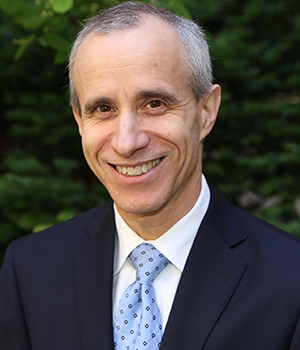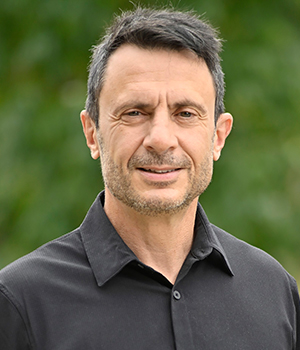The 2023 CIHR Institute of Aging Betty Havens Prize for Knowledge Mobilization in Aging
The CIHR Institute of Aging Betty Havens Prize for Knowledge Mobilization in Aging honors Betty Havens, a leading gerontologist who was committed to improving the lives of seniors with notable achievements in health services research on the aging process. This prize, based on nominations of applicants by peers, teams or organizations, recognizes an individual, team or organization that has advanced the mobilization of research in aging at a local or regional level.
For 2023 only, CIHR-IA announces three Betty Havens’ prize winners.
Recipients
Dr. Gary Nagile and Dr. Mark Rapoport

Dr. Gary Nagile
Dr. Gary Naglie is a Professor in the Division of Geriatric Medicine, Department of Medicine, and the Institute of Health Policy, Management & Evaluation at the University of Toronto. He is Vice President of Medical Services and Chief of Staff, and Chief of the Department of Medicine at Baycrest Health Sciences, as well as an Associate Scientist at Baycrest’s Rotman Research Institute. Dr. Naglie’s work on knowledge development and knowledge translation has focused primarily on driving safety in older adults, especially those with mild cognitive impairment and dementia, as well as quality of life in adults with dementia.

Dr. Mark Rapoport
Dr. Mark Rapoport is a Professor and residency program director of the geriatric psychiatry division of the Department of Psychiatry at the University of Toronto. He is a clinical scientist at Sunnybrook Health Sciences Centre, and a past-president of the Canadian Academy of Geriatric Psychiatry (CAGP). He was also a member of the Canadian Driving Initiative for Vehicular Safety in the Elderly and an associate editor of the Canadian Geriatrics Journal. He is the acting head of Geriatric Psychiatry and co-director of Human Resources and ambulatory care for Sunnybrook Psychiatrists. Dr. Rapoport’s main research focus is on motor vehicle collisions in older adults with neurological and psychiatric diseases and their treatments.
Navigating Driving Cessation with the Driving and Dementia Roadmap
The process of deciding to stop driving and the transition to non-driving is laden with safety, psychosocial and health implications, posing significant challenges for people living with dementia, their family/friend carers and healthcare providers. Despite well-documented recommendations to support affected individuals, there is a lack of accessible and trustworthy information and resources to meet their knowledge needs. To address this “knowledge-to-action” gap, Drs. Gary Naglie, Mark Rapoport and Elaine Stasiulis, and the Canadian Consortium on Neurodegeneration in Aging (CCNA) Driving and Dementia team, used the Knowledge-to-Action (KTA) framework to develop a unique online educational resource, called the Driving and Dementia Roadmap (DDR). The DDR is a comprehensive, evidence-based, person-centred collection of information, videos, worksheets and other materials to support people with dementia, family/friend carers and healthcare providers as they navigate driving cessation. The usage of the KTA framework to guide knowledge mobilization activities ensured the DDR’s strong evidence base. In addition, involving key stakeholders in a series of knowledge exchange activities enhanced the relevance, usability and accessibility of the DDR. Knowledge translation activities employed to promote the DDR’s usage has resulted in over 30,000 users from 19 countries visiting the site. The DDR has been featured on media outlets including television, radio and print. It was also selected as a resource to be posted on the World Health Organization’s (WHO) Global Dementia Knowledge Exchange platform. Results from the implementation evaluation of the DDR indicate that the DDR is shifting how people with dementia and their carers approach and manage driving cessation, suggesting that the DDR is a welcome resource that can enhance their knowledge, emotional strength and capabilities during this major transition period.

Dr. Alexandra Papaioannou
Dr. Alexandra Papaioannou is a Professor of Medicine (Division of Geriatrics) at McMaster University, a Geriatric Medicine Specialist at Hamilton Health Sciences and Executive Director of the Geras Centre for Aging Research. She holds a Tier 1 Canada Research Chair in Geriatric Medicine and Healthy Aging. She is the lead clinician-scientist of the Canadian Geriatrics Society Frailty working group and a member of the Global Frailty Network. Dr. Papaioannou is the Chair of the Regional Geriatric Program Central and past Director of the Division of Geriatric Medicine at McMaster University. She has 396+ peer-reviewed publications, 19 book chapters and 417+ published abstracts (h-index 76; 24,629+ citations). She has mentored 125+ research trainees from undergraduate to post-doctoral fellows many of whom have received nationally-funded awards. Her program of research is focused on bringing the best research evidence to the frontlines of care for older adults to age with dignity and independence.

Dr. Thomas H Hadjistavropoulos
Hadjistavropoulos’s work addresses the under-recognition and under-treatment of pain among people living with dementia. Health care staff often fail to recognize pain in this population, in part because nonverbal signs of distress can be ambiguous. His lab has extended methods validated for pain evaluation in the scientific laboratory to approaches suited to demanding clinical settings. As an example, The Pain Assessment Checklist for Seniors with Limited Ability to Communicate (PACSLAC and PACSLAC-II), has been embraced by clinical and research experts around the world and has been translated into multiple languages.
Hadjistavropoulos is working with computer vision experts toward development of an automated vision system designed to monitor pain behaviours in older adults living with severe dementia in order to address the resource limitations that stand in the way of frequent pain assessment. His knowledge translation work includes training videos/web platforms and published guidelines for health professionals. His #SeePainMoreClearly social media knowledge mobilization campaign has led to millions of impressions in social media as well as media interviews, hashtag mentions in at least 31 countries and visits to his knowledge mobilization website in at least 82 countries.
Hadjistavropoulos’ pain self-management book older adults is in its second edition. He has been influential in public policy, exemplified by his engagement with Saskatchewan health ministry officials seeking policies that would better the lives of older persons. Hadjistavropoulos has been active in implementation science and education in the public interest. As Director of the Centre on Aging and Health his interest in public affairs led to organization of very popular public events that involve the dissemination of scientific information to the public. It is notable that he contributed to the Core Curriculum of Professional Education in Pain, now adopted by IASP and influencing professional pain education in over 60 countries.
- Date modified: